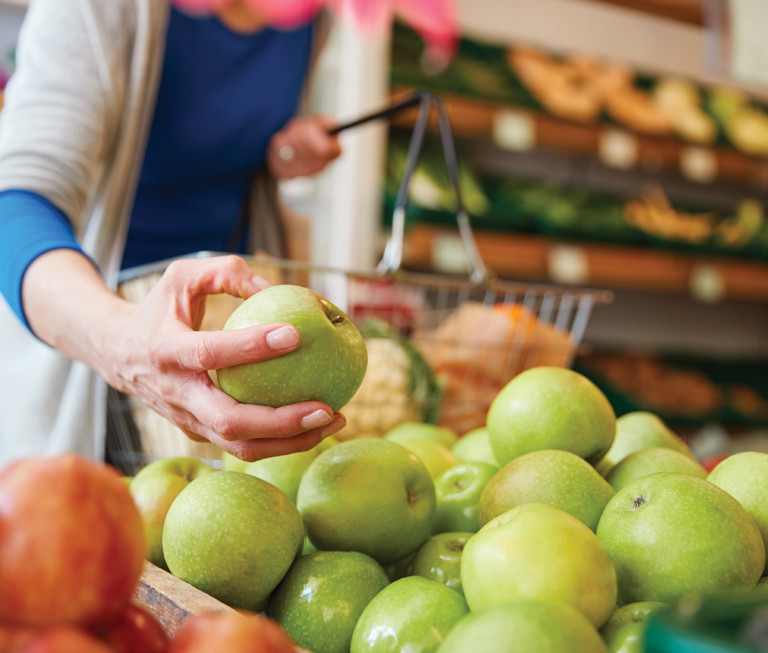
Season
update

BY NARDIA STACY
EXECUTIVE MANAGER,
POMEWEST
It is pertinent to understand the true cost of production to stay ahead of the game.
Spring is the time of plans and projects’ and with the first bud burst so starts the next pome fruit season and hopefully with a sense of optimism. After this year’s challenging harvest, with labour and rising costs of production — it is now time to reflect and plan for Harvest 2023.
Winter for Western Australia in 2022 is looking like another low chill year for most locations. Both Manjimup and Pemberton are tracking along well below the tenth percentile and are going to need some more cold days and nights to get the 70% of the average. The Perth Hills and Donnybrook are tracking along like an average year and potentially will not have an extended flowering period.
The wet and wild weather of the first week of August was well-received, however, we are tracking below average for rainfall, and we will need more to fill the dams.
We recently made a submission at the end of July to the BAM Act review on behalf of the industry, which we used to state the importance of continued biosecurity security.
Improved fumigation practises, continued eradications of pest and disease outbreaks, establishing and maintaining trapping grids, provision for regulation of minimum maturity standards for some fruits, and the management of abandoned, neglected orchards and private land for pest and disease control.
At this time, we are pleased to report that our own industry regulated maturity testing program, contracted to TQAS, is tracking well. Of the 283 tests (117 wholesale and 166 retail) collected from February to July 2022, 272 have passed and 12 failed.
Of the fails, 9 were recorded at wholesale and 3 at retail. It remains to be seen whether the quality will continue to hold with stored fruit feeding the market in the next period, however the results so far are encouraging that good tasting quality fruit is being experienced by consumers. See Figures 1 and 2 to demonstrate the result trend to date.
In tracking the latest NielsenIQ Homescan key metrics by state, in comparison to the rest of the country, WA continues to lead the country in sales — albeit the reported decline in sales growth across the board (see Table 1). Encouragingly, WA continues out-performing the other states in sales growth and household value for both apples and pears (for more details go to In this environment, ongoing and increased promotion is essential to constantly remind consumers about the value of eating fresh produce, as the best natural snacking option for human health and vitality.
WA continues outperforming the other states in household value.
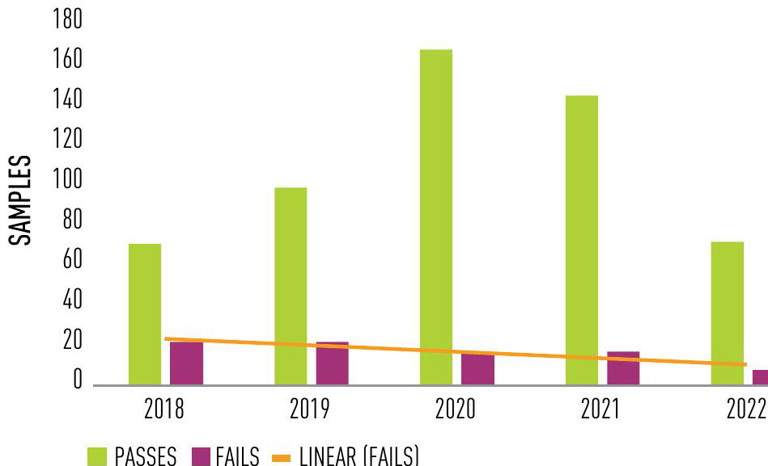
FIGURE 1. POMEWEST QUALITY PROGRAM — WHOLESALE PASSES AND FAILS 2018 TO DATE
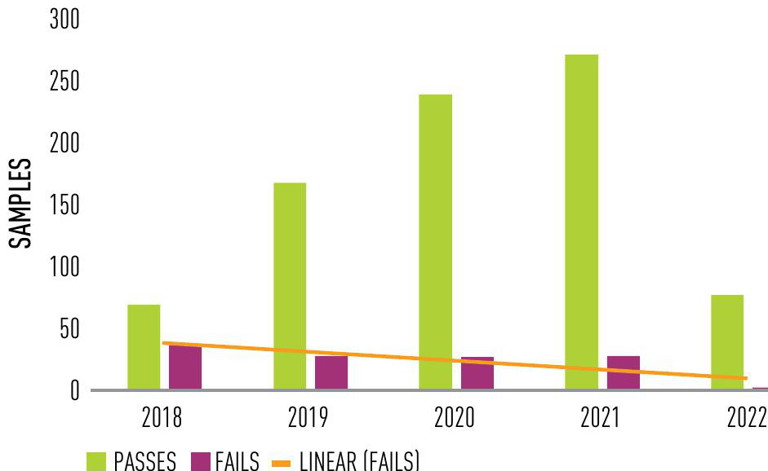
FIGURE 2. POMEWEST QUALITY PROGRAM — RETAIL PASSES AND FAILS 2018 TO DATE
With this flat growth period emerging, now more than ever, it is pertinent to understand the true cost of production to stay ahead of the game. Especially with the increased costs resulting from the current global economic environment. Any credible data-based information we can gather will greatly assist planningand decision making. The bonus is that the information gathered will be also very useful to demonstrate our position to government and the public about the health of the industry.
Hence, we encourage producers to take advantage of the opportunity to have a look at your own operations through the APC Vegetable Producers’
Committee, Hort Innovation, DPIRD, and APC subcommittee Pomewest funded Building Business Capacity Project. The outcomes will assist you in understanding your business, give you expert advice on how to find more efficiencies and give an overall opportunity to anonymously benchmark the industry. Managed by vegetablesWA and contracted to Plan Farm, for those interested, there are currently still places available to join the program.
During the downside of the season, Pomewest has been busy hosting several industry workshops, orchard tours and industry consultation activities — catching up on some of the events that just have not been possible in the last few years due to the travel restrictions of the pandemic.
In July, Pomewest facilitated two Disease Modelling Workshops (Perth Hills and Donnybrook). This activity comes from a collaborative project funded by the Donnybrook Orchard Improvement Group, Pomewest and Stonefruit WA. The sessions with guest speakers Marcel Veens and Andrew Taylor DPIRD gave some insight how the RIMpro decisions support system works with on farm weather stations. Hence, providing growers with real-time data to manage pests and disease on their own properties, based on actual weather data and predicted high-risk conditions. Particularly useful for managing diseases such as apple scab, pear scab, powdery mildew and brown rot for pome and stone growers. The sessions were well attended.
Further workshops are planned later in the year to demonstrate the impact of implementing the concept on some project participating orchards.
To boost the value of consultation with growers, we collaborated with a long-awaited APAL visit to conduct our regional annual grower dinners commencing on 16 August in Donnybrook. Following in the footsteps of last year’s model, we again invited the Perth Hills growers back down to visit their cousins in the South. We organised an informative local orchard tour to increase value and provided bus transport down and back for convenience. Feedback from previous years suggested that the Hills growers particularly liked this mixed model of consultation and networking opportunities.
Regis ter the Building Business now for Capac ity Project.
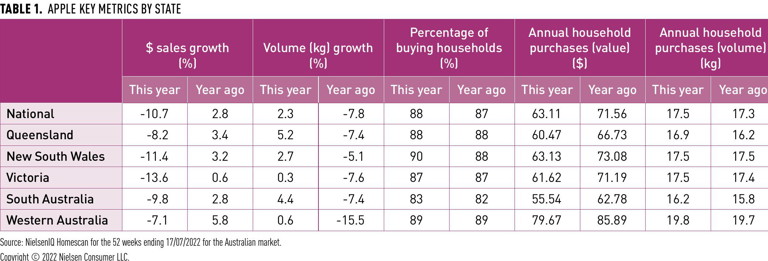
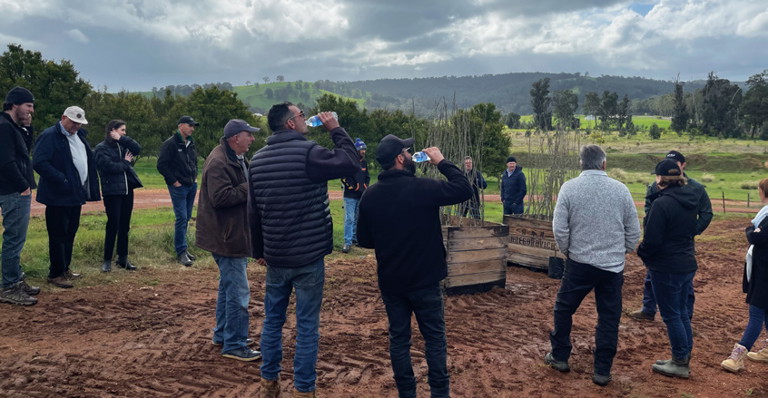
Growers at the Hearman Tree Nursery — Local Orchard Tour August 2022.
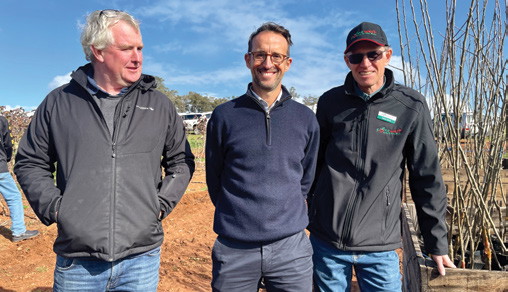
Mark Scott, Phil Turnbull APAL and Jason Jarvis of Pomewest at the Hearman Nursery.
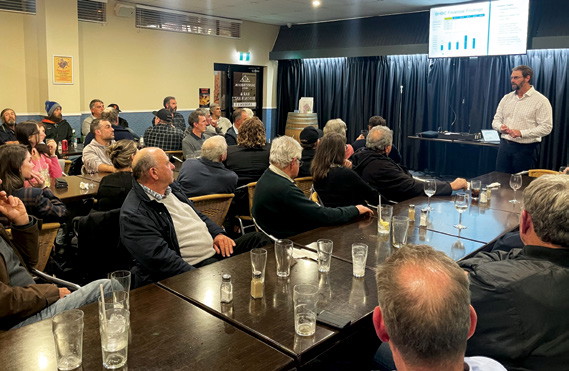
Paul Omodei presenting at the Donnybrook Annual Dinner.
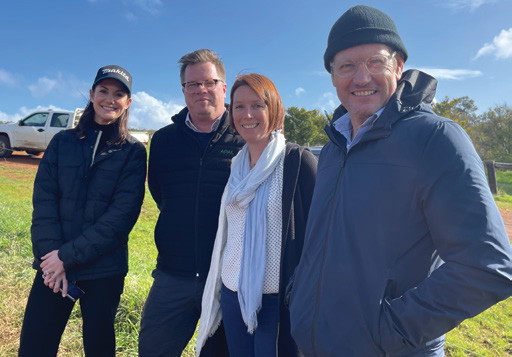
APAL contigents, Cassie Whelan, Justin Smith, Jenny Van de Meeburg and Jeremy Griffin on the orchard tour.
Check out the new Pomewest website Pomewest.net.au
On Wednesday 17 August, the Manjimup section of the tour commenced with a APAL Export Workshop at the Manjimup Horticulture Research Institute.
Interested growers, marketers and exporters attended to discuss future export programs for the progression of the WA industry into overseas markets lead by the ANABP 01Avariety. One of the key objectives in the WA Apple and Pear industry’s current Strategic Plan is to lift exports to 15% of total production within five years.
Both dinners, held on the evenings 16 and 17 August were extremely successful, with a program speaking to the outcomes of the local Building Business Capacity Program for the first two years and the Biosecurity Liaison Officer project for Pomewest and plenty of opportunity for APAL to update members on their current activities on the national arena. The dinners were well-attended by growers and invited stakeholders and great interactive discussion was enjoyed.
This edition
Susie writes details on the last Future Orchard Walk and a report on the Disease Modelling Project workshops, we celebrate the National award winners Dr Ben Darbyshire and Nicole Giblett from Newton Orchards, and report on the work done by Hort Innovation on the domestic and export market for marketing campaigns for Australian Apples and Pears funded by the Apple and Pear Levies.
Our new website Pomewest.net.au is now live; we invite all FFS to visit and register for the grower zone.
I would like finish by again inviting any grower or stakeholder to contact us if you need any assistance with any industry matters. Both Susie and I are committed to our service roles for the pome industry and always welcome your engagement and feedback.
MORE INFORMATION
Contact Nardia Stacy, Executive Manager, 0411 138 103 or nardia@pomewest.net.au